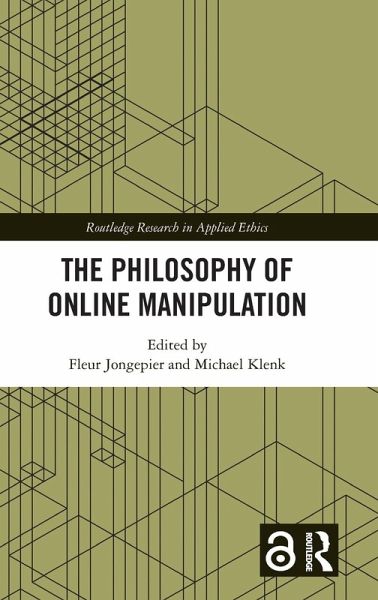
The Philosophy of Online Manipulation
Versandkostenfrei!
Versandfertig in 6-10 Tagen
154,99 €
inkl. MwSt.

PAYBACK Punkte
77 °P sammeln!
Are we being manipulated online? If so, is being manipulated by online technologies and algorithmic systems notably different from human forms of manipulation? And what is under threat exactly when people are manipulated online?This volume provides philosophical and conceptual depth to debates in digital ethics about online manipulation. The contributions explore the ramifications of our increasingly consequential interactions with online technologies such as online recommender systems, social media, user friendly design, microtargeting, default settings, gamification, and real time profiling....
Are we being manipulated online? If so, is being manipulated by online technologies and algorithmic systems notably different from human forms of manipulation? And what is under threat exactly when people are manipulated online?
This volume provides philosophical and conceptual depth to debates in digital ethics about online manipulation. The contributions explore the ramifications of our increasingly consequential interactions with online technologies such as online recommender systems, social media, user friendly design, microtargeting, default settings, gamification, and real time profiling. The authors in this volume address four broad and interconnected themes:
What is the conceptual nature of online manipulation? And how, methodologically, should the concept be defined?Does online manipulation threaten autonomy, freedom, and meaning in life and if so, how?What are the epistemic, affective, and political harms and risks associated with online manipulation?What are legal and regulatory perspectives on online manipulation?
This volume brings these various considerations together to offer philosophically robust answers to critical questions concerning our online interactions with one another and with autonomous systems. The Philosophy of Online Manipulation will be of interest to researchers and advanced students working in moral philosophy, digital ethics, philosophy of technology, and the ethics of manipulation.
This volume provides philosophical and conceptual depth to debates in digital ethics about online manipulation. The contributions explore the ramifications of our increasingly consequential interactions with online technologies such as online recommender systems, social media, user friendly design, microtargeting, default settings, gamification, and real time profiling. The authors in this volume address four broad and interconnected themes:
What is the conceptual nature of online manipulation? And how, methodologically, should the concept be defined?Does online manipulation threaten autonomy, freedom, and meaning in life and if so, how?What are the epistemic, affective, and political harms and risks associated with online manipulation?What are legal and regulatory perspectives on online manipulation?
This volume brings these various considerations together to offer philosophically robust answers to critical questions concerning our online interactions with one another and with autonomous systems. The Philosophy of Online Manipulation will be of interest to researchers and advanced students working in moral philosophy, digital ethics, philosophy of technology, and the ethics of manipulation.












